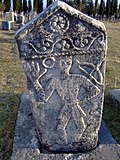Royal court in Sutjeska
| Medieval royal court of Bosnian kings in Sutjeska | |
|---|---|
Bosnian: Stolno misto | |
 Medieval royal court of Bosnian kings in Sutjeska | |
 Royal court Sutjeska Location in Bosnia and Herzegovina | |
| General information | |
| Status | Destroyed |
| Type | Royal residence / court
|
| Architectural style | Romanesque, Gothic |
| Town or city | Kraljeva Sutjeska |
| Country | Bosnia and Herzegovina |
| Coordinates | 44°07′19″N 18°12′05″E / 44.122081°N 18.201521°ECoordinates: 44°07′19″N 18°12′05″E / 44.122081°N 18.201521°E |
| Construction started | c. mid–14th century |
| Demolished | 1463 |
| Client | Bosnian bans and kings |
| Owner | state, (proscribed by KONS) |
| Technical details | |
| Structural system | Various low buildings surrounding courtyards, pavilions, gardens and royal chapel |
| Size | 2,500 to 5,000 m2 (27,000 to 54,000 sq ft) |
| Design and construction | |
| Engineer | unknown (probably local-traditional) |
Royal Court in Sutjeska was a medieval Bosnian court, residence and administrative seat of the Bosnian king, from mid-fourteenth to mid-fifteenth century, located in present-day Kraljeva Sutjeska, Bosnia and Herzegovina.[1]
In its close proximity is the location of medieval royal castle of Bobovac, the crown jewels of Bosnia were held. The royal chapel in Bobovac consisted the burial chamber of several Bosnian kings and queens. Nine skeletons have been found in the five tombs located in the mausoleum. The identified skeletons belong to kings Dabiša, Ostoja, Ostojić, Tvrtko II and Thomas. It is assumed that one of the remaining skeletons belongs to the last king, Tomašević, decapitated in Jajce on the order of Mehmed the Conqueror. Only one of the skeletons, found next to that of King Tvrtko II, is female and assumed to belong to Tvrtko II's wife, Queen Dorothy.[2]
The court in Trstionica (present-day Kraljeva Sutjeska) was established by Ban of Bosnia, Stjepan II Kotromanić. The compound consisted of several buildings, chapel, and the nucleus of what will later become Kraljeva Sutjeska Franciscan Monastery.

See also[]
| Wikimedia Commons has media related to Kraljeva Sutjeska. |
References[]
- ^ "Rulers' court of the 14th & 15th c. in Kraljeva Sutjeska". old.kons.gov.ba (in English and Bosnian). Commission to preserve national monuments. Retrieved 20 February 2019.
- ^ "Mediaeval Royal Castle of Bobovac". old.kons.gov.ba (in English and Bosnian). Commission to Preserve National Monuments of Bosnia and Herzegovina. Retrieved 20 February 2019.
External links[]
- The Royal Court in Kraljeva Sutjeska, photos at alltravels.com
- Kingdom of Bosnia
- Medieval Bosnian state
- National Monuments of Bosnia and Herzegovina
- Banate of Bosnia

